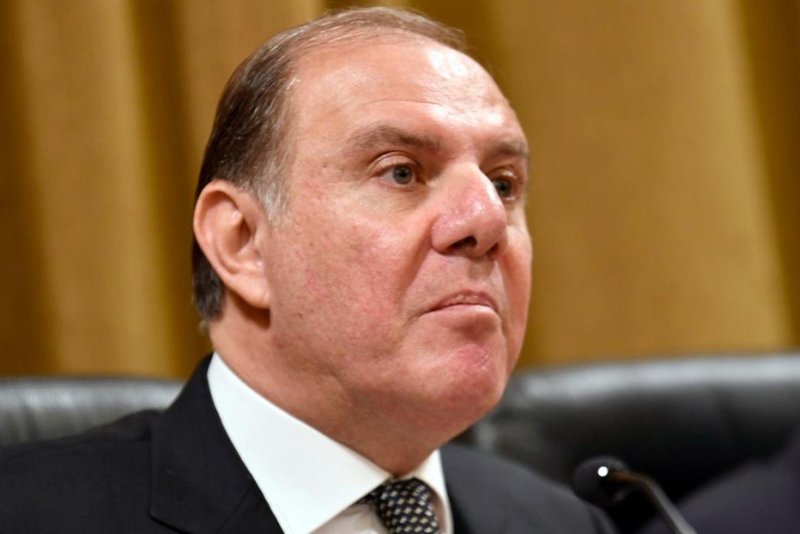Lebanon’s newly appointed Central Bank governor, Karim Souaid, speaks during a handover ceremony in Beirut, Lebanon, on Friday. Photo by Wael Hamzeh/EPA-EFE
BEIRUT, Lebanon, April 4 (UPI) — Lebanon’s new central bank governor pledged Friday to fight money laundering, terrorism and drug smuggling and emphasized the need to restructure the banking sector and return depositors’ money.
“The Central Bank will work on combating all kinds of money laundering, financing terrorism, drug smuggling, smuggling across the borders, currency counterfeiting, and the illegal circulation of money in the economy,” Karim Souaid said after he officially took office.
Lebanon has been requested, particularly by the United States, to fight financing terrorism and money laundering in exchange for helping it get out of its acute financial and economic crisis.
Washington’s main concern is to prevent Hezbollah, the Iran-backed militant group, from using the country’s banking system and cash economy to rebuild itself.
Souaid was appointed last week by the government to replace Riad Salameh, the former Central bank governor who stepped down last year after remaining in his post for three decades.
Salameh was arrested last September, becoming the first high-ranking official to be put behind bars on corruption and embezzlement charges since the 2019 financial crisis that led to the collapse of the country.
Souaid’s appointment came as Lebanon was still trying to reverse its economic crisis, described by the World Bank as one of the worst in the world since the mid-19th century.
Tackling one of the crisis’s most shaky issues, the new central bank governor said depositors’ bank savings were protected by the Lebanese law and the Constitution.
“Therefore, we should work on returning all deposits gradually,” Souaid said during the official handover ceremony with Wissam Mansouri, who served as acting central bank governor since July 2023.
Souaid said the Lebanese banks, Central Bank and the Lebanese state should shoulder their responsibilities in returning deposits, adding that the “priority” must be to first pay the small depositors whom he described as “the weakest circle.”
Depositors have been struggling to secure their rights after the banks deprived them of their life savings since the crisis began in 2019 by imposing their own rules in the absence of any government measure to regulate the financial sector.
The crisis, which the World Bank described as Lebanon’s “deliberate depression” orchestrated by the country’s corrupt ruling elite that had exploited state resources for decades, led to financial losses estimated at some $72 billion.
According to a policy paper published by Lebanese economic expert Toufic Gaspard in 2022, total bank deposits were the equivalent of $169 billion just a month before the October 2019 financial crisis. The banking collapse, Gaspard said, practically wiped out the wealth accumulated in banks by three generations.
Souaid said all private banks should increase their capital by injecting fresh funds gradually, and the ones that “are unable or do not wish to increase their capitals should merge with other banks or they will be liquidated.”
He also pledged to ensure the Central Bank’s independence and to preserve it from “political pressures and the influence of the banking sector” in order to prevent conflicts of interest.
Mansouri, the outgoing acting central bank governor, said that “the historical decision” that the Central Bank adopted to stop funding the government led to an increase in its foreign reserves by $2.2 billion since August 2023.
He said Central Bank foreign reserves reached $10.727 billion by the end of last March.
Lebanese officials have done little to adopt well-needed reforms as requested by the international community to release long-promised financial assistance and funds.
The new government, headed by Prime Minister Nawaf Salam, pledged to speed the reforms and secure the necessary funds to revive the economy and most importantly recover from Israel’s 14-month destructive war with Hezbollah.
According to the World Bank, Lebanon needs $11 billion for reconstruction and recovery from Israel’s recent war.
